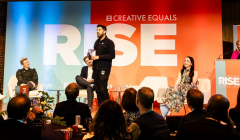
Are we leaving men and boys behind?
At Creative Equal’s RISE event, industry leaders consider how to reframe boys and men in marketing

Vikki Ross, founder of #CopywritersUnite and Sophie McGovern, the winner of the Women in Marketing Copywriters Award, on why now is the time to elevate and celebrate female talent.

“You owe it to the people coming up behind you to promote yourself, it’s important.”
Vikki Ross, the founder of #CopywritersUnite is explaining why women need to talk about their worth, and their writing publicly. “I don’t wake up in the morning and think; which women can I support today, but I have a strong sense of injustice. A human instinct. Why wouldn’t you be a champion?”
What is unique about Ross is that she uses her platform not just to elevate other creatives but the entire copywriting community. A commitment which led Ade Onilude, Founder and CEO of Women in Marketing, to approach her to create, and become the lead judge for The WIM Copywriters Award, supported by #CopywritersUnite with Ross as the lead judge.
As the award kicks off its call for entries for its second year, Ross is speaking alongside Sophie McGovern, a Copywriter at MRM, who was the very first winner of the award. McGovern is sharing the sense of achievement and moment of reflection that came with the award and is urging other women across the industry to put themselves, and each other, forward. To ask themselves to look back over a challenging year and ask the question: “What was the work that made you proud?”
It’s a self-promotional muscle that, as McGovern confides, isn’t always easy to flex. She explains: “You feel like an arsehole when you say ‘look I've done this, and it's great’. But I am so aware of the work that's gone in from women who are doing it well.”
This is particularly true when it comes to not just elevating your own work, but the craft of copywriting in itself. “Copywriting is a discipline I really enjoy. It's mud wrestling at times and in terms of creativity it can be challenging,” says McGovern who adds: “It can be hard to put your stake in the ground.”
Not all feedback is created equally. As Ross notes, when you are writing it is the best job in the world. Yet, sometimes when you send that work off into the world, you open the feedback with dread. “It’s fifty fifty,” she explains: “Pleasure and pain, love and hate.”
But it's the love that is the driving force behind Women in Marketing and the recognition and support that comes hand in hand with the community. As Ross explains: “We all celebrate Ade for recognising that copywriting needs to be championed.” She notes that when Onilude approached her about co-creating the award, she was passionate about copywriting being celebrated and recognised.
Creative departments need copywriters, they need to have Heads of Copy, there are not enough copywriters.
Vikki Ross, Founder #CopywritersUnite
As the awards open for entries, Ross is clear that women need to put themselves forward. As she explains: “Women do have an issue with nominating themselves for awards. I’ve never nominated myself for an award but if you don’t tell people what you have done and what you stand for, how are they going to know?”
Describing reading McGovern’s entry she says that her brand and tone of voice guidelines actually made her question her ability in her own work. “It made me jealous, it was such a beautiful piece of work.”
For McGovern the challenges of the Coronavirus crisis has made her think about her worth in a new way. As she explains: “In a massively challenging year knowing your worth and talking about your worth publicly is important. I’ve had the strongest year in my career and I want to be vocal about it and that is not always easy for junior staff.”
This question of women’s worth was a particularly vital one in 2020; for while gender pay gap reporting was on hold - women’s careers were not. As Ross and McGovern discuss the fact that you don’t hear men talking about how you deal with imposter syndrome.
Yet, while there is clearly a debate to be had about the gendered nature of ‘imposter syndrome’ and how useful it is as a concept at all, there is no denying that creative jobs by their nature can leave you open to a seemingly never-ending feedback loop in which the notion that ‘feedback is a gift’ is little more than a punchline to a poorly thought out joke.
As Ross shares: “When you give people copy to read they are ready with their pen to ammend it and thats really fucking annoying and deflating.”
Photoshop might stop people revising designs themselves, but almost everyone has access to a pencil. So does it stand to reason that practically everyone and anyone across the industry believes themselves to be budding copywriters?
McGovern points to the way in which the prevalence of words is linked to just how many people think they can write. But as Ross notes eloquently: “Everyone can write, but not everyone can write copy.” McGovern adds: “In my company we see it as a craft, yes you can pick up a pencil, but do you have the craft skills?”


The necessary resilience for overcoming a negative feedback loop can be particularly challenging in the midst of remote working. As McGovern explains: “In the virtual world you do reach this impasse. It gets to a point where you can go back and forth via email and you don't really get that depth of understanding. That has definitely been challenging from a morale point of view.
A situation that as Sophie explains raises the challenge of how do you re-energise for another year when you are a people person and there aren’t any people in the room?
For Ross, online or offline, the process isn't always working to ensure the best copy makes it out into the world. As she explains: “Account people are prompted to swoop in and solve problems. As a copywriter so often I’ve done work and it's gone live and you see that it's been changed.”
It’s a challenge which can be particularly acute for women. As Ross explains: “Women have been conditioned to be quiet.” She points to the cruel reality that when women do speak up and celebrate themselves there will be someone there, not necessarily cheering you on, but instead employing that ready-made silencer and self-saboteur of a sentence: “Who does she think she is?”
Notably, Ross is not afraid to address the elephant in the room; “Women don’t always support other women. There is not enough of that support and that is the unspoken truth.”.
Yet, those women not only opening the door to the next generation but busting down the barriers in their way are having a transformational effect on how the next generation of creative talent view the industry and their everyday experience of it. McGovern speaks eloquently on how MRM supports Creative Equal’s Creative Comeback scheme and the strength that comes as an agency from being truly supportive.
While having a copywriter for a boss (Nicky Bullard, Chairman and Chief Creative Officer of MRM Europe) has been nothing short of career-defining. As McGovern explains: “It was a woman who was brave enough to take me on, to elevate my career.”
Ross adds that it is rare for agencies to have senior copywriters to look up. “Creative departments need copywriters, they need to have Heads of Copy, there are not enough copywriters.” A state of play which leaves people exposed to others simply “shitting on their words."
There is no denying that the Coronavirus crisis has brought with it a unique set of emotional and economic challenges. Yet, equally there is creativity in the midst of constraint
Ross points to the fact that there has been more copy than there has been in decades by virtue of the fact production was halted. In the midst of the pandemic copywriting was uniquely vital in striking the right tone across multiple platforms and crucially showing consumers that you care.
“It's not just about ads,” she says, pointing to the work she did with Sky to update its website to focus on solving customer problems in the midst of the pandemic. “Copywriting got a surge of action in lockdown,” she adds.
McGovern shares that after five years in the industry she is still motivated by the emergence of long copy and the care that goes into the copy. She points to the shift towards direct, conversational copy as another interesting development.
“We went into a long phase where people were saying no one reads anything,” adds Ross.
An assault on long copy, she describes as pointless and distracting as that never ending, yet arguably never-truthful headline that ‘TV is dead’.
As Ross notes sagely: “People are walking into each other on their phones, they are so busy reading something.” It’s a fact that underlines the reality that even for an industry that is prone to chasing the next shiny new thing - the fundamentals remain - it is just the platforms that have changed.
We have all seen first hand what happens when you don’t keep to your word. This has given everyone a real refresher course in why words matter and we are all more cognitive to it.
Sophie McGovern, Copywriter at MRM
The future of copywriting is not just about bending to platforms; at a time when some trend watchers declare we are operating in a ‘post truth world’ the simple truth for marketers is less confusing, if slightly less exciting: consumers expect trust, transparency and honesty from brands.
As McGovern explains: “We have all seen first hand what happens when you don’t keep to your word. This has given everyone a real refresher course in why words matter and we are all more cognitive to it.”
For Ross it is less a case that brands have a responsibility to support consumers in the wake of the Coronavirus crisis and more the fact that there is a place for brands to support. Yet, this doesn’t mean that all brand messages need to be doom and gloom. “There is a real opportunity to do something different,” she says pointing to the way in which Nando’s kept to its cheeky tone of voice in its mid pandemic ‘Your place, not ours’ takeaway ads.
“We are at a unique moment of time,” says Ross who points to the “uprising of emotions on social media everyday.” A shift which means that ads that might have appeared funny in the past, won’t get the same reception today.
In the wake of a pandemic that has upended every aspect of our lives, ask many business leaders in the creative industries what their number one concern is and the chances are they will say: their staff. The mental health impact of the pandemic is well documented.
While from a business perspective the headlines surrounding ’The Great Resignation’ increasingly appear less like scaremongering and more a reflection of the high levels of staff turnover ahead. A reflection not just of the pressures of being ‘always on’ in the creative industries, but a reflection on a period of life in which it has increasingly felt much of our lives are on hold.
So in this unique, at times brutal and yet how do you create the right conditions to thrive as an individual? For Ross that ability comes with 25 years experience of copywriting and the fact that she deals directly with clients as a consultant. “I’ve always loved my job and I have always said to clients it's a collaborative process. I’m not a frustrated poet or author, I want to write good copy,” she says.
It is this open and honest love for the craft of copywriting which makes Ross such a magnet, both for good ideas and good people. There is no question that the past year has been a tough one in many ways, yet perhaps that makes it even more important to celebrate the work that made it out into the world in the most challenging of times and the people behind it.
To enter the Women in Marketing Awards 2021 click here.
Looks like you need to create a Creativebrief account to perform this action.
Create account Sign inLooks like you need to create a Creativebrief account to perform this action.
Create account Sign in